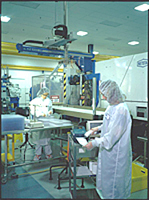How warehouse management systems are helping pharmaceuticals companies to get one step ahead.
The pharmaceutical industry is increasingly competitive as new companies enter the market place and established companies fight to maintain their position and to provide superior service to their customers.
Pharmaceutical companies are very aware that although they are manufacturers and distributors, they are ultimately in a service business, and are driven by service factors. To stay competitive they must become more productive, more accurate, and more responsive to the demands of their customers.
One of the areas where these companies can develop a competitive edge is in warehouse management. Many are taking a long hard look at their current systems to find ways in which they can optimise their existing resources, and to develop ways of staying one step ahead of the competition.
Paper-based anachronism
Many companies are running a paper-based warehouse. Such a system was probably satisfactory when the company was small, but with increasing product lines and client lists, such systems can no longer provide the productivity, accuracy and speed of turnaround required.
The warehouse productivity and accuracy problems encountered by companies running paper-based warehouse systems include:
long receiving turnaroundup to a week is not unusual
delayed order processing because of low productivity
stock control and inventory issues causing long throughput cycles, and problems in the management of product recall
lack of integration with other systems such as accounting and enterprise resource planning (ERP)
manual reporting which can be laborious, error-prone and out of date
lack of real-time reporting and information
the need to check all orders because of lack of accuracy
low quality of information relating to the distribution of free goods.
Such issues drive the need for a system that can provide increased productivity without increasing labour, tighter inventory control, increased order accuracy, and real-time information exchange.

The change that can be effected by implementing a WMS can be considerable, and provide measurable improvements in many aspects of warehouse management.
Changing for the better
Warehouse management systems (WMS) can provide the competitive edge sought by pharmaceutical companies. The best WMS will integrate seamlessly with current accounting and ERP systems, as well as with bar code, RFID (radio frequency identification) and material handling technology; provide enhanced functionality throughout the distribution cycle: and be easy to understand, work with and be trained on. Such a system must be scaleable and easily configurable to each unique requirement, and deliver accurate shipments, improved operating procedures and, ultimately, reduced costs.
The change that can be effected by implementing a WMS can be considerable, and provide measurable improvements in many aspects of warehouse management. Companies have reported a reduction in receiving time from one week to one day, an increase in same-day order processing, and 100 per cent improvement in productivity rates without any increase in staff. Even with such dramatic improvements in inventory throughput and picking speed, accuracy also showed remarkable improvements, to the extent that checking functions could be discontinued.

A WMS can provide the competitive edge sought by pharmaceutical companies.
Smooth management of track and trace
Strict inventory control allows product recall to be dealt with easily and accurately. Using RF hand held computers and bar code technology in conjunction with the WMS, every product can be tracked and traced as it is received, putaway, picked and shipped. By recording lot, serial and product numbers, each product can be tracked throughout its lifecycle in the warehouse.
Advanced reporting features enable fast and reliable data transfer and report generation, so that reporting capabilities can be transformed; one company found that monthly inventory reporting time fell by 40 per cent. Instead of waiting for reports that will be out-of-date by the time they are received, staff are able to generate accurate, timely reports on-demand. This same ability can improve the reporting on distribution of free goods. Whereas the gathering of such information on a paper-based system can be cumbersome and time-consuming, the real-time data transfer means that every free goods shipment can be tracked and reported on automatically.
Enhancing productivity, improving customer service
Companies have also found that the productivity enhancements and reporting capabilities provided by WMS can have an impact across the whole company. Purchasing, quality assurance and customer services can all use the information to support their own operations. For example, a web-enabled WMS allows the customer service team to know what is in the warehouse at any given time, allowing accurate and efficient customer service and increased order response times. Because so much information can be shared, the customer service team can be much more responsive to the client, and has much more trust in the accuracy of order and inventory information.
Staying one step ahead in a competitive market is not always easy. By implementing a world-class WMS many pharmaceutical companies are finding that the productivity, accuracy and order processing improvements will help them achieve that goal.

Darren Wildman is sales and marketing director for Kelgray Products Ltd. Kelgray is a leading data capture solutions provider and is a Global Partner for RADIO BEACON WMS, a modular, scaleable WMS system designed to seamlessly integrate with a number of leading ERP solutions and ideally suited to third party logistics suppliers, manufacturers and distributors.

Add a Comment
No messages on this article yet